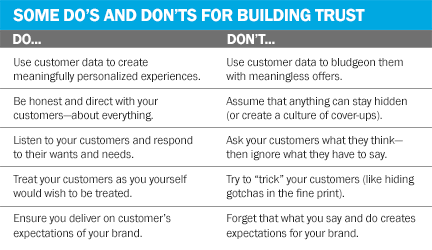Earn Customer Trust
It’s difficult enough that companies are losing influence with their digitally-enabled smart customers. Even worse, they’re losing their customers’ trust. And it’s not surprising. The fact is, many organizations are undeserving of customer trust.
Companies ravenously gather customer information, and use this data not to serve them, but to bludgeon customers with product and service offers they don’t want or need. Or, these same companies forget or ignore everything their customers said or did—right when their customers most need them to remember, like on a service or warranty call.
As customers, it often feels like companies don’t have our best interests at heart. How could any customer trust a firm that doesn’t? You certainly wouldn't. Why would your customers behave any differently?
So if your firm is operating at a trust deficit (or if you suspect it might be), here are five things you can start doing now that will help you earn it…
- Win/Win Instead of “We Win”: The best relationships are symbiotic—each party provides value to the other, and receives value in return. For example, companies can utilize technology to personalize and customize services at little cost, creating scalable, replicable “win/win” relationships with customers, giving them *just* what they want, and earning a healthy profit in the process.
- Embrace Transparency: The concept of transparency terrifies most executives. But it’s here already, and there’s nothing any firm can do to stop it. With a web connection and little more, even the most important supply chains, partnerships, pricing, and even customer data is out there for the viewing. So are your words and deeds—for everyone to see. Since you can’t hide anything, the best policy is to ensure you have nothing to hide.
- Listen: Increasingly, those brands leading their markets recognize the competitive and financial rewards of asking customers what they think—and taking the radical step of listening to them, understanding their wants and needs and actually utilizing this feedback to better serve them.
- Be Respectful: It seems pretty simple, yet it’s stunning how many companies don’t respect their customers. On hold, a voice says “Thank you for waiting. Your time is valuable to us,” then you are forced to wait 10 to 20 minutes for service. Or they impose huge fees based on “the fine print.” The list goes on. If customers don’t get the respect they deserve from you, they’ll get it elsewhere.
- Don’t Make Promises You Can’t Keep: Dispensing with the obvious (don’t promise it by Friday if you know it’ll be next Thursday), you need to recognize that customer’s expectations of what it’s like to interact with your firm–usually driven by things your firm has said–are a promise, too. If your customers’ experiences don’t match those expectations, you lose trust (and customers).

Historically, business has seldom had to revolve around the truth. That’s changing, because it’s no longer possible to hide the truth for any length of time. You should expect that all your statements and actions will be examined, tested, discussed, and shared by and among other people—many of whom aren’t even customers.
Leveraging the power of social influence, the hyper-connected, insatiably curious market will come looking. They’ll review and analyze the quality of your products, the degree to which they believe your firm is trustworthy, whether you (or your products) perform as promised, and if you did what you said you were going to do.
And if you’re found wanting, then too bad. Because your competition is only a click, call, or street away.
If you really want to keep your customers—and win more, in the crucible of a transparent, hyperactive marketspace—then it’s time to seriously think about what it means to be trustworthy, and start aligning your deeds and your words with your customers’ best interests. Because trust is the foundation and mortar that builds (and sells) a brand.
Ultimately, truth—in deeds and words—is what drives trust. And not only can this truth set your company free, it can be used to build trust as well. Between your people, the market and your customers, driving the kinds of value that only engaged, loyal customers can provide.

